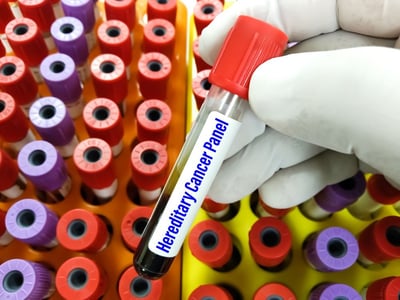Detrás de los titulares sobre el cáncer
Obtener más información sobre el programa de XRAY



Relevancia: Alta
Este artículo es de mayor interés para: Personas con un diagnóstico de cáncer que no se han realizado pruebas genéticas
Estudio: Las pruebas genéticas en las personas con cáncer pueden ayudar a descubrir mutaciones que podrían afectar el tratamiento y la prevención
A pesar de que las directrices nacionales recomiendan la realización de pruebas genéticas, menos del 10 % de los pacientes elegibles se las realizaron dentro de los dos años siguientes a su diagnóstico de cáncer De las personas que se realizaron pruebas, entre el 10 y el 30 % de ellas poseían una mutación hereditaria que podía influir en su atención médica. (publicado el 15/3/2024)
Leer más ›


Relevancia: Media-alta
Este artículo es de mayor interés para: Adultos jóvenes
Artículo: Señales de alarma del cáncer colorrectal en adultos jóvenes
Se ha observado un aumento en el índice de casos de cáncer colorrectal en adultos jóvenes. Los investigadores de este estudio identificaron cuatro signos o “señales de alarma” del cáncer colorrectal antes de los 50 años (considerado cáncer colorrectal de manifestación temprana). Reconocer estas señales de alarma puede ayudar a diagnosticar y tratar el cáncer colorrectal en etapas iniciales. (Publicado el 23/10/23)
Leer más ›



Relevancia: Alta
Este artículo es de mayor interés para: Personas interesadas en las pruebas genéticas
Artículo: Las pruebas genéticas y el futuro de la medicina
Un artículo publicado en Katie Couric Media habla sobre el tema de las pruebas genéticas y el impacto que tienen en la salud. La autora del artículo conversó con el Dr. Robert Steiner, un médico especializado en genética. El Dr. Steiner habló sobre las pruebas genéticas y cómo los resultados pueden afectar la salud y cambiar la vida de las personas. (Publicado el 28/9/23)
Leer más ›


Relevancia: Media-baja
Este artículo es de mayor interés para: Personas con tumores sólidos.
Artículo: Dan inicio estudios clínicos con prometedor medicamento para tratar el cáncer
El equipo de investigación de City of Hope está sometiendo a prueba un nuevo tipo de medicamento para tratar el cáncer. En las primeras pruebas en animales y en células extraídas de cánceres de seres humanos, este nuevo medicamento impidió el crecimiento de muchos tipos de cáncer. Apenas se iniciaron los primeros estudios clínicos con personas. (Publicado el 9/7/23)
Leer más ›


Relevancia: Media-alta
Este artículo es de mayor interés para: Adultos jóvenes
Tema: Aumento de casos de cáncer colorrectal en adultos jóvenes: lo que los jóvenes millennials y de la generación Z deben saber
En Estados Unidos, desde la década de los noventa se ha observado un aumento de casos de cáncer colorrectal en adultos jóvenes. Los científicos están tratando de descubrir las razones de este aumento de casos. (Publicado el 15/8/23)
Leer más ›


Relevancia: Media
Este artículo es de mayor interés para: Personas con cáncer que están embarazadas.
Tema: Repercusiones de las nuevas leyes sobre el tratamiento contra el cáncer durante el embarazo
La Corte Suprema de EE. UU. dictaminó en 2022 que el aborto ya no es un derecho protegido por la Constitución. Esta decisión histórica deja la regulación del aborto en manos de los estados. El tratamiento contra el cáncer durante el embarazo puede verse afectado en los estados que prohíben o limitan el aborto. (Publicado el 31/5/23)
Leer más ›


Relevancia: Media
Este artículo es de mayor interés para: Personas interesadas en reducir el riesgo de cáncer.
Estudio: Aumentar el consumo de soya en su dieta puede disminuir su riesgo de cáncer
Este estudio analizó la relación entre una dieta rica en soya y el riesgo de cáncer. Con la adición de bibliografía más reciente, este estudio sugiere que la soya reduce el riesgo de cáncer en la población general. (Publicado el 2/24/23)
Leer más ›


Relevancia: Alta
Este artículo es de mayor interés para: Indígenas estadounidenses y nativas de Alaska
Tema: Desigualdades por cáncer en las poblaciones indígenas estadounidenses y nativas de Alaska
La Sociedad Estadounidense contra el Cáncer (ACS, por sus siglas en inglés) incluyó una sección especial en su informe de hechos y cifras sobre el cáncer de 2022 que habla del tema de las desigualdades por cáncer en las poblaciones indígenas estadounidenses y nativas de Alaska que habitan en Estados Unidos. Esta publicación subraya los puntos principales de la sección especial, incluyendo las desigualdades en la detección, diagnóstico y niveles de supervivencia en comunidades nativas, así como los factores que contribuyen a que se presenten estas desigualdades. (Posted 12/20/22)
Leer más ›


Relevancia: Media-alta
Este artículo es de mayor interés para: Las personas actualmente en tratamiento contra el cáncer
Directrices: Pautas sobre ejercicio, dieta y peso durante el tratamiento del cáncer
La mayoría de las pautas profesionales sobre ejercicio, dieta y control del peso se han centrado en la salud de la población general y los supervivientes de cáncer. La Sociedad Estadounidense de Oncología Clínica (ASCO) ha publicado ahora recomendaciones basadas en pruebas sobre ejercicio, dieta y peso específicamente para personas que están en tratamiento activo contra el cáncer. (Publicado el 29/11/2022)
Leer más ›


Relevancia: Media-alta
Este artículo es de mayor interés para: Personas con cáncer colorrectal en etapa inicial
Estudio: Las biopsias líquidas ayudan a personalizar el tratamiento contra el cáncer de colon en etapa inicial
Las biopsias líquidas localizan el ADN y otros materiales de las células cancerosas en la sangre o en otros fluidos corporales. Estas pruebas pueden ser de ayuda para detectar con anticipación la reaparición del cáncer, vigilar la respuesta al tratamiento u orientar la selección del tratamiento para las personas que recibieron un diagnóstico de cáncer. Este estudio analizó un tipo de biopsia líquida llamada “tumoral circulante” (ADNtc) para identificar a las personas con cáncer de colon en etapa inicial que pueden omitir la quimioterapia sin correr riesgos después una cirugía. (22/11/22)
Leer más ›